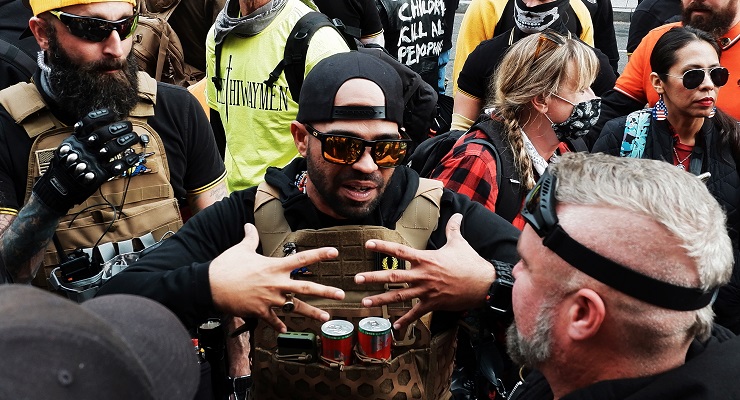
Feeling confused about the various ideologies and groups that form the extreme right? If so you’re not alone. Even the experts find it challenging to stay on top of the modern variants and mutations of far-right advocates of hate.
And while the threat is receiving far greater attention from policymakers and intelligence agencies in the United States and Australia, far-right organisations keep investigators on their toes because there’s no one unifying ideology, says terrorism expert and director of research and policy at The Soufan Group Colin Clarke.
The Soufan Group was formed by Ali Soufan, the former FBI agent responsible for warning of the dangers of al Qaeda in the late 1990s, and the organisation has spent the past few years warning of the greater risk of domestic terrorism by far right extremists.
It is also an area that is receiving greater attention from policy makers and intelligence agencies in the United States and Australia. Both countries have official inquiries into the scope of the threat posed by extremists with the American inquiry having a specific focus on the role played by former military and law enforcement personnel on the far-right.
Former Prime Minister Kevin Rudd has also bought into the debate on extremism during the inquiry into media diversity by pointing to many far-right extremist groups that exist in the United States and the role media outlets such as Fox News have played in radicalising politics in America.
The threat is made up of many disparate groupings, Clarke tells Crikey, including anti-government militias that distrust the “deep state”, white supremacist and national socialist groups, organisations that advocate for “Western chauvinism” such as Proud Boys, and, of course, conspiracists such as those drinking the QAnon Kool Aid.
“It’s really hard to describe QAnon,” Clarke said. “It is really a conspiracy theory. There’s a heavy dose of anti-Semitism there which is accommodated by the broader far-right umbrella.
“You have people who are unaffiliated. People that kind of sample like a buffet from each of these forms of extremism. I call them lone actors. They believe they are part of this broader movement.”
The January 6 insurrection at the US Capitol saw far-right militia groups such as the Oath Keepers and Three Percenters make high-profile public appearances along with Proud Boys.
Oath Keepers and the Three Percenters position themselves as protectors of the American constitution, Clarke says, but the jury is still out on how well they understand the constitution they profess to protect.
“When pressed, I would guarantee you that a healthy portion of these people have never read the constitution,” he said.
“One of the things we witness here in the United States is that people are learning their history from memes. Even the Three Percenters is a misnomer. It is based on this historical and inaccurate notion that only 3% of Americans fought in the American revolution.”
Extremist groups have used social media and encrypted messaging applications to spread their propaganda, recruit and organise activities, after both Twitter and Facebook removed extremist groups and individuals from their platforms over the past two years.
“[Extremists] are pushed to more marginalised fringe platforms where they become more difficult to monitor in some cases,” Clarke said.
“I’m still of the mind that getting them off these mainstream platforms is better in the long run because they cannot reach as many people.”
Clarke says the threat posed by domestic terrorists is just as challenging as the jihadist threat that has occupied the US for more than two decades since the September 11, 2001, attacks. (The Soufan Group, formed by Ali Soufan –the FBI agent responsible for warning of the dangers of al-Qaeda in the late ’90s — has warned of the increasing risk of far-right extremism for years.)
“You have extremists that are on American soil and, to boot, who have access to sophisticated weaponry that is not illegal to acquire,” Clarke said.
“You know the issue with the United States: we are armed to the teeth.”








Al-Queda wasn’t ever an existential threat to the ‘West’..It didn’t have the military industrial complex fire power to platform destruction on the same level playing field ..But the intrinsic homegrown extreme
Right Wingism born of the West by the West for the West, is a bit like its own dangerous roosting chook homing pigeons, at war with itself, on its own ideological terror-tories..